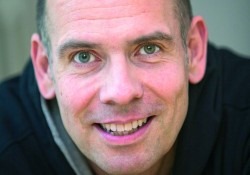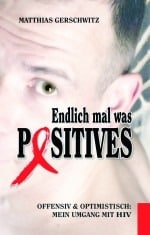The book "Finally something positive" by Matthias Gerschwitz is causing a stir. "Offensive and optimistic: My approach to HIV" is the subtitle, and this is exactly how the trained advertising manager - who has tested positive for 15 years - describes his personal experiences. Paul Schulz met the Berlin author.

Matthias, would you be angry with me if I said: "Finally something positive" is exactly the book I want from a gay man?who works in advertising?
Not necessarily. What do you mean by that?
The basic tone of the book is remarkably ... cheerful. For being about HIV.
Oh, that's not the book, that's just me. The text is very much characterised by how I see things. And that's rather positive. Like everything else (laughs). As a native Rhinelander, I am said to have a certain basic cheerfulness, and not without good reason. I've lived in Berlin for a long time now because I generally like it better here than in Cologne, for example, but you can never quite get the "Et hät noh immer jot jejange" out of your head.
Do you think the tone is appropriate for the topic?
Sure. That was one of the reasons for writing the book in the first place: My basic experience is that you can have a really good life even with the virus; a life that is not determined by the virus.
That's nothing new, is it?
Maybe not for you. But I keep realising at readings and also in normal contact with other people who have little contact with the topic: the general level of knowledge about HIV and Aids is really poor. Many people hear "HIV" and are still immediately afraid. And this book is mainly for them. It is intended to answer initial questions and provide information in an entertaining way.
Isn't it a bit thin for that?
That was also intentional. I didn't want to write a book that would put people off, but one that people would enjoy picking up even if they don't normally read that much. Once you've read the 96 pages, you're already smarter.
You also put forward controversial theses in the book.
You mean on the subject of unsafe sex?
For example.
To be honest, I don't think my view is controversial. Unsafe sex is rubbish, even among positive people, because you can probably not only infect yourself with other strains of HIV, but also with a whole range of other really unpleasant sexually transmitted diseases that can cause you problems in combination with the HIV infection. I think that makes sense to most people straight away. And the men for whom it doesn't make sense simply don't come into my bed.
Why are you an ambassador for World AIDS Day?
It's about showing your face. To bring World AIDS Day, and thus also people infected with HIV, out of the big "nothing". To make the disease tangible.
Isn't remembrance important to you? It's not "nothing".
I am in favour of a paradigm shift here. At the moment, World AIDS Day in Berlin is defined by a funeral march that ends in a sea of candles. But that's not all there is to life with HIV and AIDS. I don't find myself there at all. I always feel the need to stand at the side of the road and shout: "Hello, I'm still alive!" - For God's sake, I don't want to forbid anyone from remembering or mourning, but I would be in favour of focusing more on life with HIV than on death from the consequences of AIDS. Of course, too many people are still dying, but there are also tens of thousands living with the virus in Germany every day.
You look good, you're in a good mood and you're obviously doing well. How do you communicate to your readers why it's better not to get infected?
Which brings us to the really difficult part. It's not so easy to visualise that there is always a "before" and an "after", and that life with the virus is okay, but life without the virus and the constant medication is preferable. That's why I talk openly about the side effects of the medication, about the discrimination you can experience as a positive person and about the fact that although I can be happy with the virus, it would be much easier without it.
(Interview: Paul Schulz)
Matthias Gerschwitz: "Finally something positive - Offensive and optimistic: My approach to HIV" (Books on Demand)










